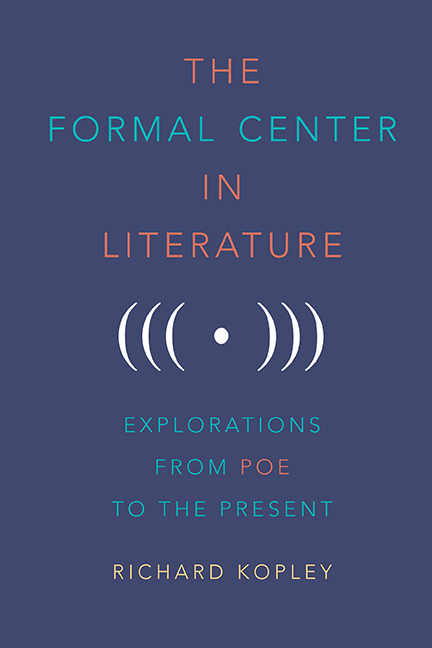Book contents
- Frontmatter
- Dedication
- Contents
- Acknowledgments
- Introduction
- 1 “Mournful and Never-Ending Remembrance” in Edgar Allan Poe's The Narrative of Arthur Gordon Pym
- 2 Retracing Our Steps in Edgar Allan Poe's “The Man of the Crowd”
- 3 “Scrutinizing the Parchment More Closely”: The Form of “The Gold-Bug” and Its Relationship to That of the Dupin Tales
- 4 Form and Reform in Nathaniel Hawthorne's “Earth's Holocaust”
- 5 The Circle and Its Center in Herman Melville's “Bartleby, the Scrivener”
- 6 Chiasmus in Henry David Thoreau's Walden
- 7 The Mythological Centers of Lewis Carroll's Alice Books
- 8 Table as Text in James Joyce's “The Dead”
- 9 The Structure of Sherwood Anderson's “Hands”
- 10 The Architecture of Ernest Hemingway's “The Three-Day Blow”
- 11 Balance in Dashiell Hammett's The Maltese Falcon
- 12 Framing Caesar in Raymond Chandler's The Big Sleep
- 13 The Ridge of the Domino in Patricia Highsmith's Strangers on a Train
- 14 The “X in the Air” in Joyce Carol Oates's “Where Are You Going, Where Have You Been?”
- 15 The Hybrid Center of Zadie Smith's White Teeth
- Notes
- Bibliography
- Index
- Frontmatter
- Dedication
- Contents
- Acknowledgments
- Introduction
- 1 “Mournful and Never-Ending Remembrance” in Edgar Allan Poe's The Narrative of Arthur Gordon Pym
- 2 Retracing Our Steps in Edgar Allan Poe's “The Man of the Crowd”
- 3 “Scrutinizing the Parchment More Closely”: The Form of “The Gold-Bug” and Its Relationship to That of the Dupin Tales
- 4 Form and Reform in Nathaniel Hawthorne's “Earth's Holocaust”
- 5 The Circle and Its Center in Herman Melville's “Bartleby, the Scrivener”
- 6 Chiasmus in Henry David Thoreau's Walden
- 7 The Mythological Centers of Lewis Carroll's Alice Books
- 8 Table as Text in James Joyce's “The Dead”
- 9 The Structure of Sherwood Anderson's “Hands”
- 10 The Architecture of Ernest Hemingway's “The Three-Day Blow”
- 11 Balance in Dashiell Hammett's The Maltese Falcon
- 12 Framing Caesar in Raymond Chandler's The Big Sleep
- 13 The Ridge of the Domino in Patricia Highsmith's Strangers on a Train
- 14 The “X in the Air” in Joyce Carol Oates's “Where Are You Going, Where Have You Been?”
- 15 The Hybrid Center of Zadie Smith's White Teeth
- Notes
- Bibliography
- Index
Summary
WE MAY BEGIN with a remarkable short story from Steven Millhauser's award-winning volume, We Others: New and Selected Stories, “Getting Closer.” This story concerns a boy, Jimmy, “nine going on ten” (58), who has anticipated with pleasure a trip to Indian Cove with his family. However, once the family arrives, the boy delays going swimming because he's decided that once he enters the water, the day will begin. He wants to forestall that moment: “He wants to stay on this side of things, to hold it right here” (63). Millhauser's brilliant recovery of boyhood, glowing with faithful detail and thought, is deftly arranged with symmetrical language over the course of fourteen paragraphs.
I first read the story naively, yieldingly, nearly remembering from my own boyhood what Millhauser has described. Then I reread, with a tentative hope, looking for a subtle symmetry that might intensify or underscore meaning. Flipping the pages back and forth between the beginning and the end, I encounter “he's ready to begin” (59) and “he steps over the line and begins his day” (64). Checking within that frame, I discover “they passed the wooden sign with the words INDIAN COVE and the outline of a tomahawk” (59) and “what he wants is to go back to the wooden sign with the tomahawk” (63). I notice within that pair “this is it” (59) and “The river is it” (62). I'm encouraged, and I press on, reading closer to the center: “His father once told him the Housatonic's a tidal river” (60) and “He can see ripples there, like very small waves: a tidal river” (62). Pleased to see the design emerging, I then observe, “Julia [his sister] throws herself in, begins swimming out to the barrels” (60) and “Julia's looking at him from where she's resting against a barrel” (61). Sliding closer toward the center, I detect, “Then he begins rolling it [the inner tube] bumpily over the grass around the end of the picnic table toward the pine where Grandma's sitting” (60) and “Behind him's Grandma in her chair, the floor of pine needles, the picnic table” (61). With growing anticipation, I see, near the center, in the seventh of the fourteen paragraphs: “Grandma's chair isn't the heavy long one from the porch, with adjustable positions, no, she's got the small one with a straight back that unfolds with one easy pull” (60).
- Type
- Chapter
- Information
- The Formal Center in LiteratureExplorations from Poe to the Present, pp. 1 - 12Publisher: Boydell & BrewerPrint publication year: 2018



